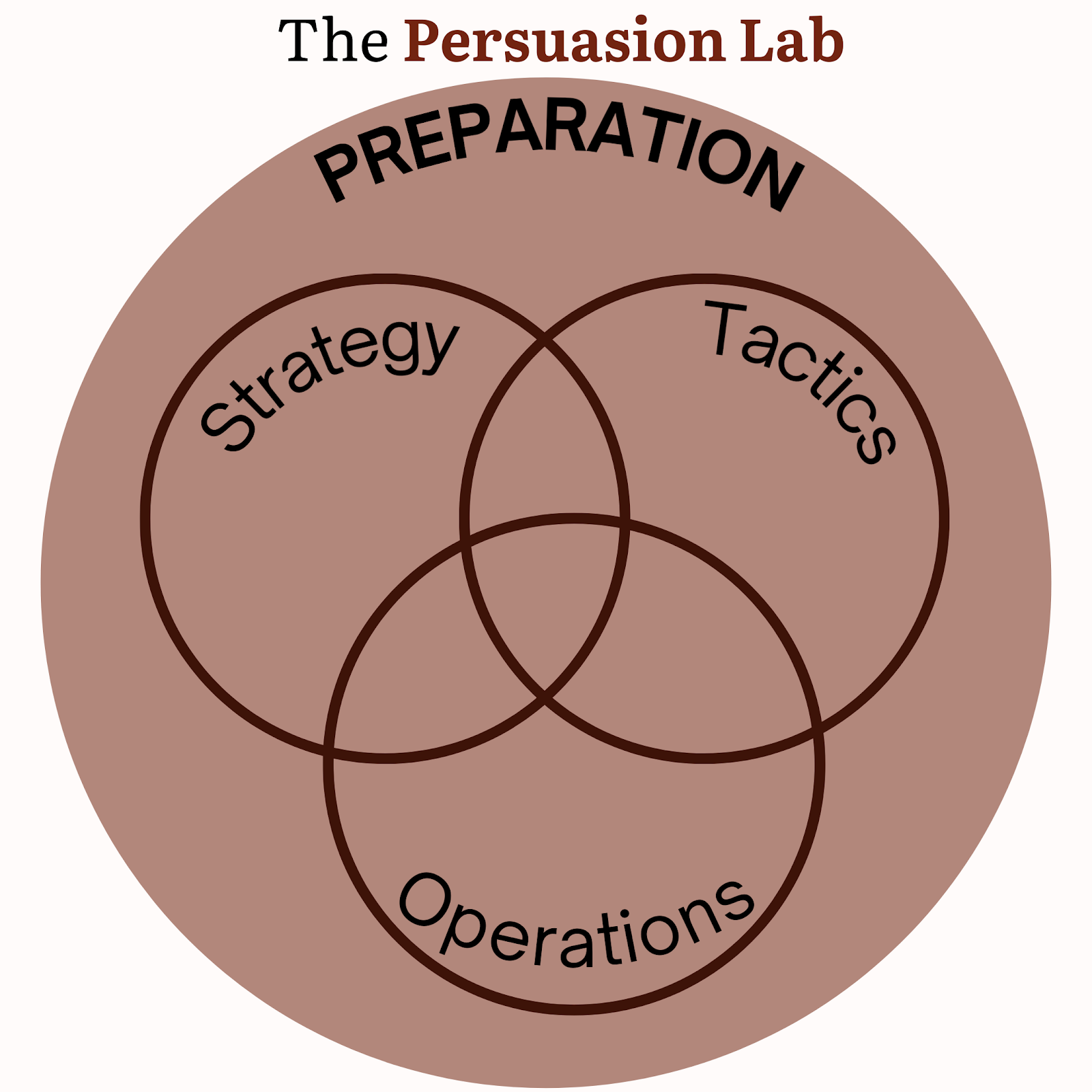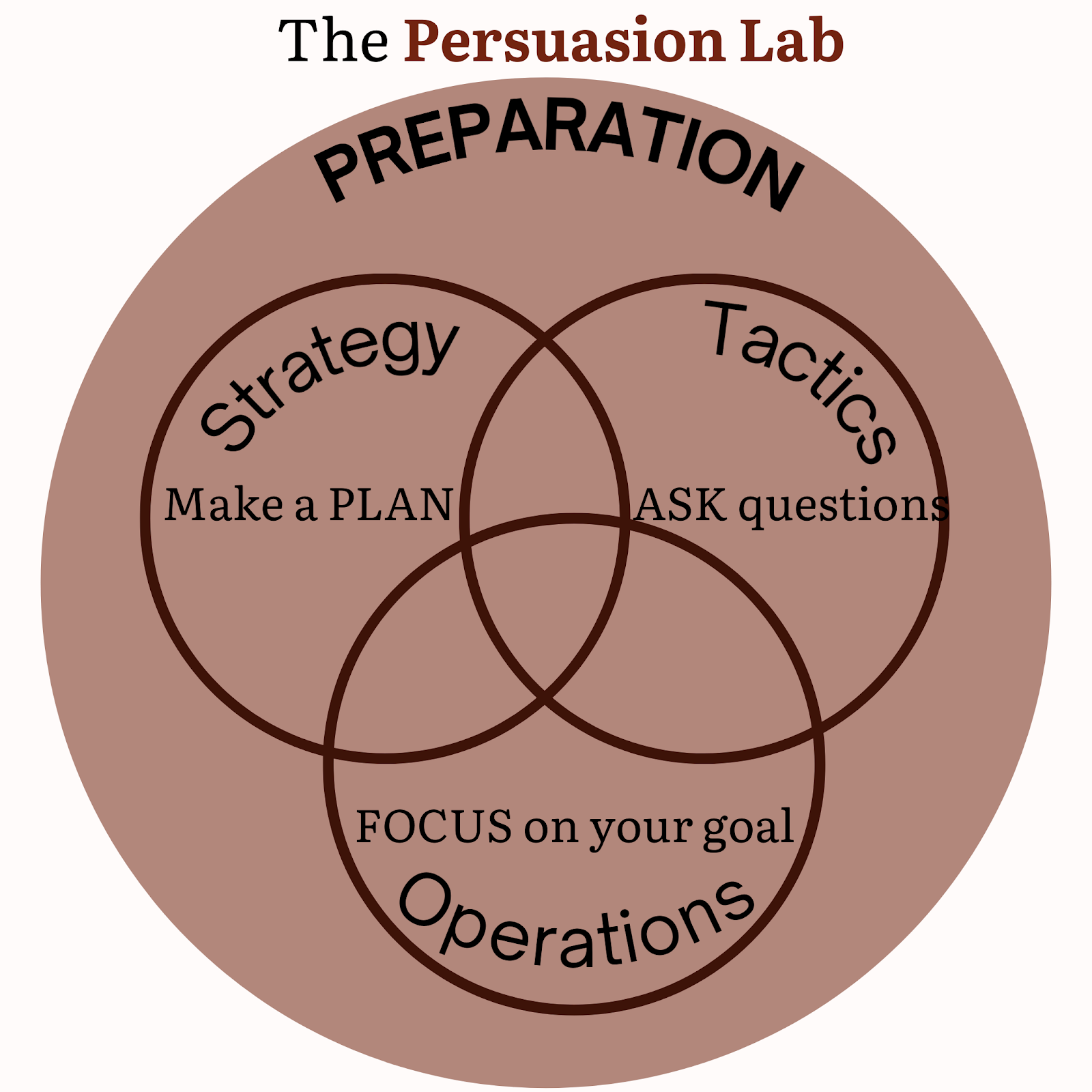You’re busy, I’m busy, so I’ll just give it to you up top:
The #1 absolutely critical negotiation technique that 9 out of 10 people miss is: preparation.
Preparation is king is because it encompasses every other aspect of negotiation and persuasion: tactics, strategy, and operations. Unless you have extraordinary luck (which you don’t), preparing well or neglecting to do so will absolutely make or break your negotiation.
Make no mistake, your prep work shows from your first contact with the other parties of a negotiation, be they hiring managers, the owner of a company you’re looking to acquire, a sales rep, a date…
If you’re a music person, you can liken the prep for a negotiation to the hours and hours a great musician puts in for that hour to 90 minutes onstage. If you’re someone who follows sports, consider the years of work leading up to a world championship or olympic event. Jesse Owens is attributed a quote speaking to “a lifetime of training for ten seconds” of a race.
While negotiation is a fundamental life skill in my view (negotiation is how you communicate your needs to the world! If you’ve got needs (which you do), you’re communicating them more or less effectively), there are some specific ways to prep that, while they may not take a lifetime, will positively impact time spent actually negotiating.
Read on to learn the key considerations for excellent negotiation prep and how to use them to mitigate any foreboding or fear you might have about your negotiation. Or, simply skip to the bottom for the summary. Oh, and if you’re one of the many who misses this most crucial step (or who is unsure how to go about prepping in a foolproof way) download your done-for-you checklist here.

Use Checklists
My dad was a paratrooper in World War II. He later stopped jumping out of planes as a pilot back at home for the rest of his life. Growing up, time spent with him and his plane meant time spent with checklists: preflight; takeoff; landing; and contingency. They were all laminated, lovingly typed by my mother, tucked in the cockpit side pouch. If you’re yet unfamiliar with the genesis of checklists, an excellent resource is Dr Atul Gawande’s The Checklist Manifesto. While, as a surgeon, Dr. Gawande’s focus is on the use of checklists in the context of the operating room, he spells out other industries in which checklists save lives: aviation and construction.
Unless you’re flying an aircraft, negotiating a hostage release, or at the table where non-proliferation nuclear deals are being done, your negotiation checklists aren’t going to be the difference between life and death. What checklists do provide, however, are the following:
The ability to assess risks. If your risk/reward calculation leans too heavily to the risk side, you need to make an honest appraisal of whether or not entering into this negotiation is even worth it. Sometimes it is. If the rewards are phenomenal and reachable, a high risk may be well worth it. Then again, maybe not. With a checklist, you’ve at least done your due diligence and made an informed decision.
Ensure acquisition of necessary resources. A checklist will allow you to see every angle of a negotiation, including any and all holes that need patching. Is knowledge or information lacking? Do you need to do research to fill that gap, or hire a specialist? Is there an expert in a field you need to recruit for your team? What background info on the other side do you need to have beforehand for greatest leverage? A checklist will walk through all of this and more to make sure you’ve got what you need before the conversation starts.
Frees you up to think on your feet. The moments of actually doing a deal can be incredibly high pressure. When millions of dollars are on the table, you don’t want to be thinking about whether or not you remembered this or that research, or if you’ll actually be able to hire that attorney, etc, etc. In those moments, you want to be able to focus, 100%, on what’s in front of you. In other words, your thinking needs to be nimble so that you can deploy appropriate tactics in the right way in correct combinations. If you’ve done your checklist before your negotiation, your mind can duck and weave to keep up in the moment.
Timing
The best negotiations do not happen instantaneously. Or, I should say, negotiations that don’t have to do with sale or acquisition of low-priced, one-time purchase commodities don’t happen instantaneously. They take time. You’ve got to build the know, like, trust factor, which, for better or worse, is not something that happens in 15 minutes or less.
A crass but appropriate metaphor: dating. On a first date, you’re probably going to take some extra time getting ready, make yourself extra presentable. You may or may not do some background research on the person you’re meeting via social media or Google (no judgement).
You’re (likely) not taking your date right to bed when you first meet. You’re going to have a drink, some food, talk, get to know one another. You may not even take them to bed after many dates. It may take marriage before you are comfortable enough to make that leap.
You’ve got to warm your negotiation partner(s) up before you try to take them to bed.
Know where you are and where you want to be
Let’s stick with this dating metaphor for just a bit longer. If you’re someone ready to settle down and get married, you’ve no business dating someone who’s still playing the field, and vice versa. You may well like that other person, but neither of you will be satisfied over the long term. You both know your goals and ideal outcomes, and they just aren’t matched up.
When it comes to negotiation, you need to be absolutely crystal clear on what your ideal outcome is. Are you looking for ‘the one’ or just some fun? Do your goals match the goals of the people/parties you’re negotiating with? If the answer is ‘well, um, no…’ MOVE ON. [For more scenarios to move along from, check out this blog post] I like to say, “choose your life partner very carefully; choose your business partners twice as carefully. ” A business breakup can cost much more than a divorce. Goal matching is one thing, but also what I call “affinity matching” is quite another.
You’ve absolutely must be crystal clear about where you’re starting from, right now, in this moment. Even if your goals are aligned, it’s worth considering: are you the equivalent of an unemployed 30-something with a standard wardrobe of sweatpants and a grease-stained t-shirt living in his mother’s basement trying to land a woman with a high six-figure salary, condo, flawless wardrobe, and body to match?
Yeah, hate to break it to you, but it’s not gonna happen. Deal, or partner affinity matching is important.
In your negotiation prep, consider:
- What leverage do you have?
- What leverage do they have?
- Are the two comparable?
- What do you have that they want?
- What do they have that you want?
- Are the two comparable?
It’s worth remembering that great negotiators will dazzle and distract you from your endgame to get their goals met. The more clear you are, and the better able you are to keep your goals top of mind, the better your outcome will ultimately be.
If you’re nervous about your negotiation, write down on actual paper what your goal is. Keep that paper out in front of you on your notepad as you’re in those rooms (virtual or in person) having the conversations. Just this one action alone can be a game changer.

Communication
Communication is part of the operations of a negotiation: what are the logistics of how you’re talking to the other people involved?
First things: ASK what’s the best way to communicate with the other person/parties. Email? Text? Phone? In person? Carrier pigeon?
Once you have this information, you can actually speed up or slow down a negotiation. Say they get back to texts within 10 minutes, but it takes 24 hours or longer to hear back on email? Text them to get stuff done ASAP, email them to buy some time.
In an entirely informal and not peer reviewed survey, we asked some professional negotiators their most preferred communication modalities. In our sample, males tended to prefer phone conversations, while females tend to prefer face to face interaction. Interesting to consider as you figure out this operational piece of the puzzle.
Of course, the majority of interpersonal communication is nonverbal… if you’re entering into a delicate or emotionally charged conversation, having access to the nonverbal body language is critical. Consider an in-person meet (COVID notwithstanding), and if you’re doing the virtual thing, have the other person back their camera up so you can get a much wider view of their nonverbal cues.
Got it? Great!
Skimmed and missed some stuff?
Here’s the TL:DR Summary
- Checklists! Use ‘em if you got ‘em! (Grab yours here)
- Gather info re: background pieces at play.
- Get experts if you need them.
- Rank risk level, act accordingly.
- Know communication preferences up front and use that information accordingly!
- Assess (with honest clarity) where you’re at and where you’re trying to go
Want to hear the audio to go along with the blog? Listen to The Persuasion Lab Podcast #58 on Spotify, Apple Podcasts, Buzzsprout, or wherever you get your podcasts!

